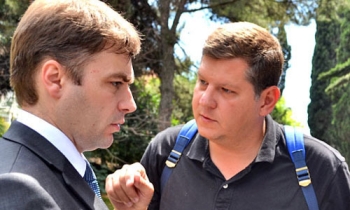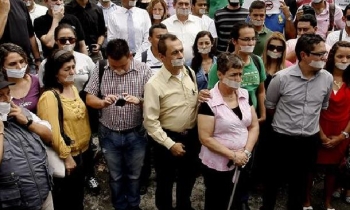The new repressive resolution of Uzbekistan that targets journalists working for foreign news media who dare to criticise government policies has found its first victim.

The foreign ministry has decided to withdraw press accreditation from Obid Shabanov, correspondent of the German public radio station Deutsche Welle in the southern region of Bukhara. "The foreign press is still paying the consequences of the bloody crackdown in Andijan in May of last year," Reporters sans Frontières (RSF) said. "After the bans on the BBC, the American media NGO Internews and Radio Free Europe/Radio Liberty, it is now Deutsche Welle's turn. The Uzbek government has taken one more step towards total news control."
The government passed by resolution on February 24 punishes foreign media journalists who meddle "in internal affairs" or insult "the honour and dignity of Uzbek citizens." Foreign journalists are placed under permanent suspicion of wanting to overthrow the regime. Accreditation can be cancelled or not renewed, and the procedure for requesting registration has been extended from 10 days to two months.
Independent journalists have been particularly affected by the new resolution. Articles 22 and 23 introduce additional restrictions banning both Uzbek and foreign citizens from cooperating with non-accredited journalists under pain of prosecution. Article 21 clearly likens journalists to terrorists by providing for the expulsion of those who call "for the overthrow of the constitutional order or for racial or religious hatred."
Shabanov is the new resolution's first victim. His accreditation was withdrawn on March 15 on the grounds that he included false information in a dispatch for Deutsche Welle on February 1, when he reported that some 30 people had died tragically in a bus. They had died of cold in a Moscow-bound bus that had no heating.
Another Deutsche Welle correspondent, Salikh Yakhyev, who also works for the news website Ferghana.ru, has being served a warning for not having official accreditation. Yuri Chernogayev, the Tashkent correspondent of Deutsche Welle and the Russian daily Kommersant, has also received a warning for working with a non-accredited journalist.

According to RFE/RL, if one phrase could convey how Uzbekistan's leadership now views its relations with the West, it would be "information war." Uzbek President Islam Karimov made that very clear at a news conference on March 20. "Today the nation is under an information attack by many Western countries," he said, an "information war...so unscrupulous that it's impossible to find another word to describe it." One country in particular is propagating the war but, he said, "I won't name it."
In remarks apparently addressed to the West, Karimov warned: "Your model of democracy is absolutely inappropriate for us. Your model and your values are absolutely unacceptable because we live in Uzbekistan, where 85 percent of the population is Muslim. These are people who profess Islam. And our values are naturally different from the values that we call Western values."
Another foreign organisation to come under fire is the World Bank. Karimov criticised the bank for a report that estimated inflation in Uzbekistan at 31 per cent and unemployment at 20 per cent. Asserting that an International Monetary Fund commission in December 2005 estimated inflation at 7 per cent, Karimov, according to RFE/RL, concluded that the World Bank was not merely wrong, but that it "crossed out these figures in an attempt to discredit Uzbekistan." Days earlier, the World Bank had suspended lending to Uzbekistan.
The UN High Commissioner for Refugees (UNHCR) the same day announced that Uzbekistan's foreign ministry had shown it the door. Tashkent said the UNHCR had "fully implemented its tasks and there are no evident reasons for its further presence in Uzbekistan"; the UNHCR, while promising to comply, noted that 2,000 Afghan refugees in Uzbekistan depend on its assistance. UNHCR had angered the Uzbek government by, in 2005, helping to airlift 439 Uzbek refugees from Kyrgyzstan to Romania. Human Rights Watch believes UNHCR's expulsion may be connected with that.









